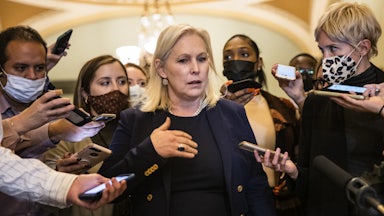“But truth’s a menace, science is a public danger,” said Mustapha Mond, the “Controller” in Aldous Huxley’s Brave New World. “We have to keep it most carefully chained and muzzled.”
Perhaps Huxley’s dystopian vision can help us make sense of the fact that the Trump administration is taking a chain saw to America’s scientific research. The proposed 2026 budget calls for a devastating 37 percent cut in funding for biomedical research through the National Institutes of Health; a 56 percent cut in science research funding through the National Science Foundation; and further, major cuts in science budgets at NASA, NOAA, the EPA, the CDC, the Agriculture Department, the Energy Department, the U.S. Geological Survey, the Forest Service, and other smaller agencies. Make no mistake: This is a total war on science in America. If an enemy power wished to demolish one of the pillars of American economic, military, and political strength over the past century, this might be what they would do.
At first glance, these moves are so baffling that many observers are tempted to deny that it is happening. Even the MAGA faithful understand that science is part of what has made American great. So why has the administration declared war on science?
To start, we should keep in mind that there is probably no master plan. Multiple overlapping agendas and factors are driving the destruction. But there is a deeper motivation at work too. The conservative movement in America—the same movement that decades ago demanded science as the answer to Sputnik—has turned its back on the very idea of science.
That’s because the conservative movement has become an antidemocratic movement, and it understands at some level that the truth is its enemy. Scientific research is in some respects collateral damage in a wider war on democracy.
This anti-rationalist ideology comes in several flavors, not all of them consistent. One wing comes out of the evangelical hard right, which has long argued that science has been turned into a weapon against faith. A large subset of the Christian nationalist movement, for instance, claims climate science is not merely a hoax but a secular plot to undermine religion.
This thinking is on vivid display at the little-known Cornwall Alliance for the Stewardship of Creation. Cornwall, an anti-environmental policy initiative, vilifies environmental science as a “Cult of the Green Dragon.” In the alliance’s view, environmentalism is an alternative—and false—theology.
The Cornwall Alliance is led by E. Calvin Beisner. Before founding Cornwall, Beisner was a co-founder of the Coalition on Revival, a large network of evangelical and right-wing Christian leaders and theologians that gathers every few years in a different locale. COR members have adopted explicitly dominionist and Reconstructionist ideological positions. They advocate theonomy, the idea that American laws should be based on a reactionary reading of the Old and New Testaments. Think promoting “corporal discipline of children as a means of teaching Godly behavior” and banning “deviant activities as acceptable alternative lifestyles,” not Sermon on the Mount.
In spite of these positions, many religious right leaders insist that theirs is the scientific view. They believe that what passes as science now is deeply infused with a value judgment—that scientific rhetoric is being deployed to advance the view that humans should subordinate themselves to nature.
Then there is a different approach emerging from people in the orbit of far-right think tanks such as the Claremont Institute. They hold the view that science has become part of a “woke bureaucracy”—Michael Anton, who currently serves as Trump’s director of policy planning, has variously defined it as the “university NGO international busybody complex” and the “globalist borg” that is intent on pushing undesirable social views and cutting off opportunities for a genuine—and dictatorial—leader of “the people.” Some New Right representatives say we need a more monarchical form of government, a “Red Caesar” who can enact his will without facts and reason getting in the way. They see in science an evil directorate, and they simply want to destroy it.
A third, much smaller but highly influential group includes the slice of tech bros who have allied with the authoritarian movement. Some believe that AI and other allegedly private-sector forces will soon dominate science; therefore, we don’t need the traditional government funding system. They want us instead to put our blind faith behind them, the wizard-founders, who they insist are the absolute best at everything they do and can be therefore counted on to pursue science on behalf of all humanity—or at least on behalf of their own ballooning fortunes.
It may seem surprising that the rise of technopolies dovetails with anti-scientific attitudes. But some of these founders are convinced they don’t need to do the science; they already know the answers because the answers are whichever technology turns out to be most profitable for them under a misregulated market. If we needed further evidence that some tech ideologues have embraced a profoundly antisocial misrepresentation of the purposes of science, then we need look no further than the billboards that have recently sprouted throughout the San Francisco Bay area: “Stop Hiring Humans.”
The various flavors of irrationalism in the current regime, mixed with unprecedented levels of sheer incompetence, have given us the war on science in its current form.
One of the major targets of the administration’s aggression, for example, is the university system. Right-wing ideologues have long griped that America’s universities are bastions of liberal power that willfully discriminate against conservatives. The Republican base has largely bought into this story. The administration now wants the power to exert control over faculty and curricula, or at least undermine the independence of its academic critics. But how can it do so? This is where the war on science comes in.
Over the past century, universities have emerged as key nodes in the scientific establishment that converts public funds into research. On the whole it has been a spectacularly successful system. But it has had the unintended effect of rendering the universities hostage to federal funding. It so happens that a good chunk of that funding goes into biomedical research. In brief: This administration is willing to let people die of cancer if that’s what it takes to win the war on supposedly “woke” universities.
Another target of the administration’s aggression is this thing called the “administrative state.” It’s hard to say exactly what the administrative state is, other than a catchall for everything that conservative ideologues don’t like about government. The trouble is, of course, that the administrative state is really the workings of a functioning democratic government, and the biggest part of the government consists of administering things that are very hard to cut: the Defense Department foremost, but also things like air traffic management, nuclear safety, and so on. Much easier to cut are contracts with outside suppliers, especially those whose benefits accrue to future generations. In short: Science funding has fallen victim to the conservatives’ need to perform violence against a demonized bureaucracy.
Right now, we are only seeing the short-term consequence of the Republican war on science: Projects are canceled, and funding is denied, individual careers are broken, research institutions are diminished, and scientists drain out of the country for safe havens around the world. The long-term consequences of Trump’s war on science are likely to be far more serious.
What can we do about it now? Congress could stop this, but of course it won’t as long as MAGA holds the Republican majority hostage. The courts are slowing some of it, but they won’t change the overall direction alone. Private actors and foundations can step in to cover some gaps, but their efforts are likely to amount to Band-Aids.
The biggest problem is that there is a war going on and very few people seem to have noticed. Scientists will need to step forward and help the public understand the value of their work. Historians need to step forward and explain the extraordinary achievements of the American research university system. The rest of us need to get the message out. The true consequences of this equation will show up 10 and 20 years from now, when our once-great democracy faces health, climate, and other crises that might well have been avoided.










